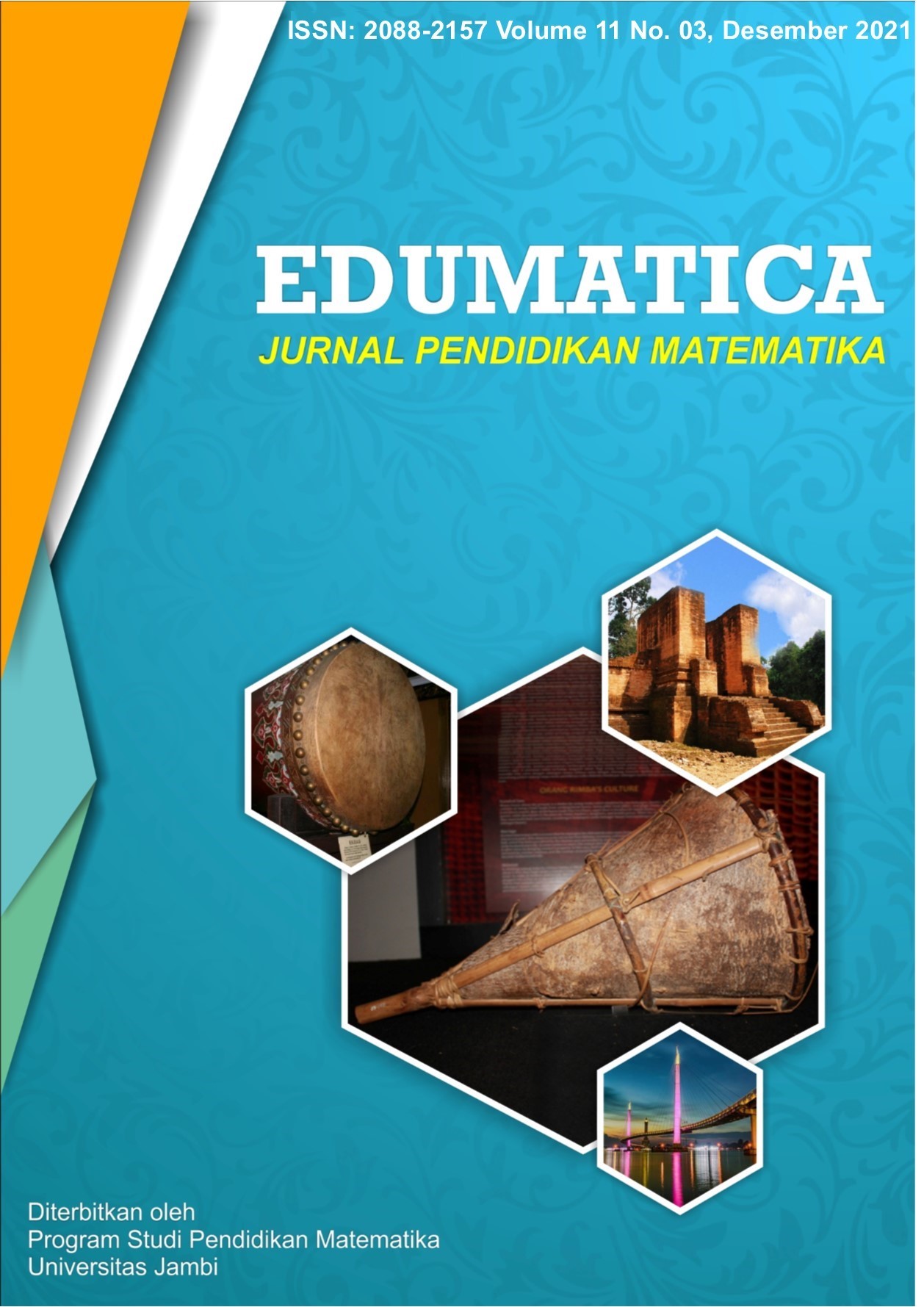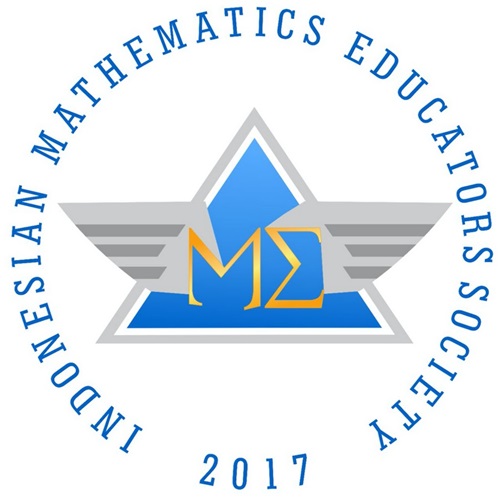The Development of Flipped Classroom Model Trigonometry Learning Tools improves Students' Mathematical Communication Skills
DOI:
https://doi.org/10.22437/edumatica.v11i03.14497Keywords:
communication skills, flipped classroom, initial skills, learning toolsAbstract
The purpose of this research is to produce valid, practical and effective Flipped Classroom-based mathematics learning tools and to improve students' mathematical communication skills. The method used in this research is the Ploom development model. The development of the Plomp model is namely the initial investigation phase, the development phase, and the assessment phase. Learning tools developed in the form of lesson plans, student worksheets and learning videos. The subjects of the field test were students and educators in class X of SMAN 3 Jambi for the 2020-2021 academic year. The research instruments used were instruments at the initial investigation stage, validity test instruments, practicality test instruments and effectiveness test instruments. The results of the validation of the Flipped Classroom-based mathematics learning device were valid in terms of construct and content. The validity values obtained for lesson plans, learning videos, and worksheets are 3.41; 3.17; and 3,4. Flipped Classroom-based math learning tools are practical in terms of implementation and ease of use. The results of the questionnaire analysis of the student's practicality data showed a figure of 81% so that it was categorized as practical from the observation data on the implementation of learning and interviews. The resulting learning devices are effective in improving students' mathematical communication. The results of the final test of students' mathematical communication skills are 77.78% of students who have scored above the KKM.
Downloads
References
Alfitri, A. (2016). Kemampuan Komunikasi Matematis Siswa melalui Blended Learning Berbasis Pemecahan Masalah. PRISMA, Prosiding Seminar Nasional Matematika, 1(1), 191-202. https://journal.unnes.ac.id/sju/index.php/prisma/article/view/21457
Arikunto. (2008). Dasar-dasar Evaluasi Pendidikan. Bumi Aksara.
Armiati, Yerizon, & Niscaya, R. (2019). Flipped classroom based mathematics learning equipment for students in grade X SMA. Journal of Physics: Conference Series, 1317(1). https://doi.org/10.1088/1742-6596/1317/1/012129
Bhagat, K. K., Chang, C. N., & Chang, C. Y. (2016). The impact of the flipped classroom on mathematics concept learning in high school. Educational Technology and Society, 19(3), 134-142.
Cartwright, K. (2020). Analyzing students’ communication and representation of mathematical fluency during group tasks. Journal of Mathematical Behavior, 60(October), 100821. https://doi.org/10.1016/j.jmathb.2020.100821
Chen Hsieh, J. S., Wu, W. C. V., & Marek, M. W. (2017). Using the flipped classroom to enhance EFL learning. Computer Assisted Language Learning, 30(1-2), 1-21. https://doi.org/10.1080/09588221.2015.1111910
Chu, T. L., Wang, J., Monrouxe, L., Sung, Y. C., Kuo, C. li, Ho, L. H., & Lin, Y. E. (2019). The effects of the flipped classroom in teaching evidence based nursing: A quasi-experimental study. PLoS ONE, 14(1), 1-12. https://doi.org/10.1371/journal.pone.0210606
Cronhjort, M., Filipsson, L., & Weurlander, M. (2018). Improved engagement and learning in flipped-classroom calculus. Teaching Mathematics and Its Applications, 37(3), 113-121. https://doi.org/10.1093/TEAMAT/HRX007
Damayanti, H. N., & Sutama, S. (2016). Efektivitas Flipped Classroom Terhadap Sikap Dan Ketrampilan Belajar Matematika Di Smk. Manajemen Pendidikan, 11(1), 2. https://doi.org/10.23917/jmp.v11i1.1799
Hodiyanto, H. (2017). Kemampuan Komunikasi Matematis dalam Pembelajaran Matematika. AdMathEdu : Jurnal Ilmiah Pendidikan Matematika, Ilmu Matematika Dan Matematika Terapan, 7(1), 9-18. http://journal.uad.ac.id/index.php/AdMathEdu/article/view/7397
Hwang, G. J., Wang, S. Y., & Lai, C. L. (2021). Effects of a social regulation-based online learning framework on students’ learning achievements and behaviors in mathematics. Computers and Education, 160, 104031. https://doi.org/10.1016/j.compedu.2020.104031
Kadir. (2008). Kemampuan komunikasi matematik dan keterampilan sosial siswa dalam pembelajaran matematika. Seminar Nasional Matematika Dan Pendidikan Matematika, 339-350. http://eprints.uny.ac.id/id/eprint/6949
Kadry, S., & Hami, A. El. (2014). Flipped Classroom Model in Calculus II. 4(4), 103-107. https://doi.org/10.5923/j.edu.20140404.04
Kementerian Pendidikan dan Kebudayaan. (2014). Permendikbud Nomor 59 tentang Kurikulum 2013 Sekolah Menengah Atas/ Madrasah Aliyah. 20, 322-417.
Larsen, J. (2015). Adult Students’ Experiences of a. Flipped Mathematics Classroom. Adults Learning Mathematics: An International Journal, 10(1), 50-67.
Maolidah, I. S., Ruhimat, T., & Dewi, L. (2017). Efektivitas Penerapan Model Pembelajaran Flipped Classroom Pada Peningkatan Kemampuan Berpikir Kritis Siswa. Edutcehnologia, 3(2), 160-170. https://ejournal.upi.edu/index.php/edutechnologia/article/view/9147/5684
Masitah. (2018). Pengembangan Perangkat Pembelajaran untuk Memfasilitasi Guru Menumbuhkan Rasa Tangung Jawab Siswa SD terhadap Masalah Banjir. Proceeding Biology Education Conference, 15(1), 40-44.
Moore, C., & Chung, C.-J. (2015). Students’ Attitudes, Perceptions, and Engagement within a Flipped classroom model as Related to Learning Mathematics. Journal of Studies in Education, 5(3), 286-308. https://doi.org/10.5296/JSE.V5I3.8131
Muliyardi. (2006). Pengembangan Media Pembelajaran Matematika Berbasis Komik di Kelas I Sekolah Dasar. UNESA.
Plomp, T., & Nieveen, N. (2013). An Introduction to Educational Design Research SLO • Netherlands institute for curriculum development (T. Plomp & N. Nieveen (eds.)). Netherlands institute for curriculum development (SLO). www.slo.nl
Rangkuti, A. N., & Fitriani, F. (2019). Pengaruh Pendekatan Pembelajaran PBL Dan PjBL Terhadap Kemampuan Komunikasi Matematis Mahasiswa pada Mata Kuliah Statistik. Ta’dib, 22(2), 67. https://doi.org/10.31958/jt.v22i2.1578
Ranti, G. M. (2015). Meningkatkan Kemampuan Komunikasi Matematis Siswa Menggunakan Strategi Writing To Learn pada Siswa SMP 4 Mayang Gadih Ranti. Jurnal Pendidikan Matematika, 1(2).
Rasyid, M. A. (2020). Kemampuan Komunikasi Matematis Dalam Pembelajaran Matematika. Jurnal Edukasi: Kajian Ilmu Pendidikan, 5(1), 77-86. https://doi.org/10.51836/je.v5i1.116
Saman, Ma’rufi, & Tiro, A. (2019). Pengembangan Video Pembelajaran Matematika Dalam Meningkatkan Minat Dan Prestasi Belajar Siswa Pada Materi Persamaan Linear Dua Variabel. Pedagogy, 4(1), 1-11. https://doi.org/10.30605/PEDAGOGY.V4I1.1426
Setiaji, F., & Suherman, S. (2019). Analisis Kemampuan Komunikasi Matematis : Dampak Model Pembelajaran Discovery Learning Terintegrasi Learning Start With A Question. Desimal: Jurnal Matematika, 2(1), 33-42. https://doi.org/10.24042/djm.v2i1.3544
Soedjadi. (2001). Pendidikan Matematika Realistik. Surabaya. UNESA.
Suherman, E. (2003). Strategi Pembelajaran Matematika Kontemporer. FMIPA UPI.
Susanto, A. (2013). Teori Belajar dan Pembelajaran di Sekolah Dasar. Kencana.
Velegol, S. B., Zappe, S. E., & Mahoney, E. (2015). The evolution of a flipped classroom: Evidence-based recommendations. Advances in Engineering Education, 4(3), 1-37.
Yanti, Y. A., Buchori, A., & Nugroho, A. A. (2019). Pengembangan Video Pembelajaran Matematika melalui Model Pembelajaran Flipped Classroom di Sekolah Menengah Kejuruan. Imajiner: Jurnal Matematika Dan Pendidikan Matematika, 1(6), 381-392. https://doi.org/10.26877/imajiner.v1i6.4868
Yulietri, F., Mulyoto, M., & S, L. A. (2015). Model Flipped Classroom dan Discovery Learning Pengaruhnya Terhadap Prestasi Belajar Matematika Ditinjau dari Kemandirian Belajar. Teknodika, 13(2). https://jurnal.fkip.uns.ac.id/index.php/teknodika/article/view/6792
Downloads
Published
How to Cite
Issue
Section
License
Copyright (c) 2021 Ayudita Ardila, Jefri Marzal, Jodion Siburian

This work is licensed under a Creative Commons Attribution-NonCommercial-ShareAlike 4.0 International License.







